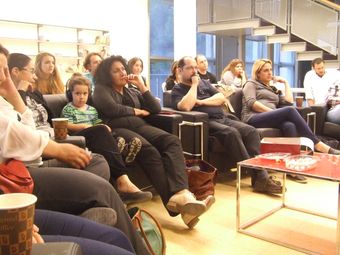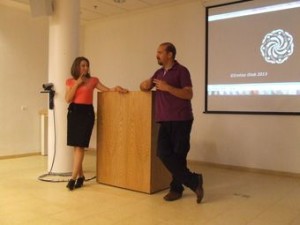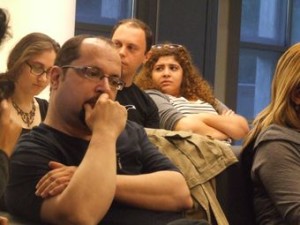Update on the Peace Library
In the recent period we have purchased many books, installed computers, furniture, multi-media system and we are developing the World Peace College. We are planning to open an MA program in conflict resolution with University of Massachusetts Boston in the fall off 2015. We have now the American faculty and the Israeli faculty Israeli Jewish and Palestinian professors who will teach in the program. We are very excited about the program and the students will study in the Fred Segal Friendship Library.
In addition, we conducted several important programs in the Library.
Annual conference of Psychoactive
On October 26, 2013 took place the annual conference of the organization Psychoactive – Mental Health Professionals for Human Rights. Approximately 60 participants took part.
About Psychoactive – Mental Health Professionals for Human Rights
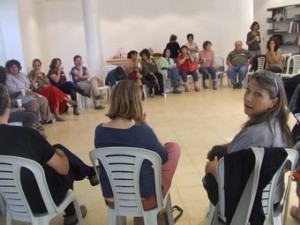 We are a group of practicing and academic mental health professionals who have set ourselves the goal of being active in areas of social-political concern, especially the Palestinian-Israeli conflict. The group developed out of the members’ need to expand therapeutic discourse and practice to include the social and political contexts of our lives. These contexts are relevant to all aspects of therapeutic theory and practice; it is our goal to shed light on them and to draw attention to their manifold influences on the therapeutic space. In addition, we wish to examine the significance of our position as health professionals within public services and institutions, with the aim of promoting social activity extending beyond the cloistered clinic, for the benefit of individuals and groups whose voice is presently absent from both the public domain and the professional discourse.
We are a group of practicing and academic mental health professionals who have set ourselves the goal of being active in areas of social-political concern, especially the Palestinian-Israeli conflict. The group developed out of the members’ need to expand therapeutic discourse and practice to include the social and political contexts of our lives. These contexts are relevant to all aspects of therapeutic theory and practice; it is our goal to shed light on them and to draw attention to their manifold influences on the therapeutic space. In addition, we wish to examine the significance of our position as health professionals within public services and institutions, with the aim of promoting social activity extending beyond the cloistered clinic, for the benefit of individuals and groups whose voice is presently absent from both the public domain and the professional discourse.
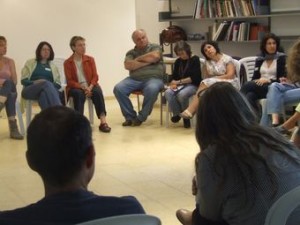 We use our professional skills in mental health to deepen the understanding of the influence of conflicts—national, gender, social, economic, and ethnic—on the practice of psychotherapy and on the participants in individual and group psychotherapy. Through increased understanding of these influences, we hope to generate forms of professional intervention that contribute to social and political change. Much of our activity relates to the occupation of the West Bank and Gaza, the ongoing conflict between Palestinians and Israelis, and the psychological consequences of this situation for occupied and occupier. We wish to facilitate processes of change within the Israeli-Jewish public so as to further a resolution of the Israeli-Palestinian conflict. Our membership includes Palestinian and Israeli therapists, and we believe that joint action is a significant means to advance change.
We use our professional skills in mental health to deepen the understanding of the influence of conflicts—national, gender, social, economic, and ethnic—on the practice of psychotherapy and on the participants in individual and group psychotherapy. Through increased understanding of these influences, we hope to generate forms of professional intervention that contribute to social and political change. Much of our activity relates to the occupation of the West Bank and Gaza, the ongoing conflict between Palestinians and Israelis, and the psychological consequences of this situation for occupied and occupier. We wish to facilitate processes of change within the Israeli-Jewish public so as to further a resolution of the Israeli-Palestinian conflict. Our membership includes Palestinian and Israeli therapists, and we believe that joint action is a significant means to advance change.
Our group serves as an arena for individual initiatives which develop into work- and action- groups involving various members. A wide range of activity options is available to members: participation in our internet forum, participation in group meetings and activities, and taking initiative in organizing additional activities. The group consists of over 300 members to date.
The School for Peace conducted since 2007 four courses for mental health professionals in each there were about 20 Israeli Jews and 20 Palestinians. Many of them are active today in Psychoactive.
Meeting with Historians
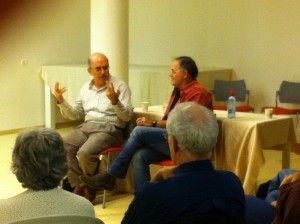 On November 7, 2013 there was a meeting with historians, Dr Adel Manna and professor Motti Golani following their published book “Two sides of the coin” – both narratives, the Palestinian and the Israeli, concerning the 1948 war and the Nakba.
On November 7, 2013 there was a meeting with historians, Dr Adel Manna and professor Motti Golani following their published book “Two sides of the coin” – both narratives, the Palestinian and the Israeli, concerning the 1948 war and the Nakba.
Forum for SFP facilitators, this time on racism and sexism in civic organizations
On the 5th February 2014 the forum for SFP facilitators convened in the Fred Segal Peace and Friendship Library for the second time. This time we listened to a lecture by Dr Raghda Elnabilsy on her research on racism and sexism within civic organizations. It is a research initiative of the “My Sister” women’s movement and the organization Arous Elbahar. The research consisted of a year-long process with four groups of women: Palestinian, Mizrahi, Russian speaking, and Ethiopian Jews. The groups met once every two weeks and discussed their experiences of the subject for the sake of the research.
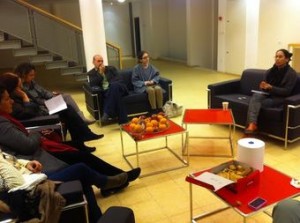 Five themes arose from this social process: 1. Civic society reproduces the power relationships between those who hold knowledge and expertise, mostly Ashkenazi Jews, and everyone else. 2. There is a separation or division between parts of civic society on concepts of human rights and social justice, and stopping the occupation. 3. The patriarchy of racism: in all four groups the women mentioned forms of racism they experienced from the Ashkenazi Jews. 4. Leaders of civic organization are mostly middle class. 5. In all the four groups the women mentioned that, although they want to play an active part in civic organizations, they mostly found themselves being used as fig leaves by those organizations. After the lecture there was a discussion between the facilitators that took part in the meeting. The forum takes place once every two months, and each time a facilitator presents on material they have written.
Five themes arose from this social process: 1. Civic society reproduces the power relationships between those who hold knowledge and expertise, mostly Ashkenazi Jews, and everyone else. 2. There is a separation or division between parts of civic society on concepts of human rights and social justice, and stopping the occupation. 3. The patriarchy of racism: in all four groups the women mentioned forms of racism they experienced from the Ashkenazi Jews. 4. Leaders of civic organization are mostly middle class. 5. In all the four groups the women mentioned that, although they want to play an active part in civic organizations, they mostly found themselves being used as fig leaves by those organizations. After the lecture there was a discussion between the facilitators that took part in the meeting. The forum takes place once every two months, and each time a facilitator presents on material they have written.
Community process
From January to April 2014, the members of Neve Shalom – Wahat al-Salam gathered at the Fred Segal Friendship Library to hold five half-day workshops, in which we talked about issues concerning the life of the village that we usually do not have an opportunity to raise. We discussed the future of the community, the role we should have in Israeli society in the face of growing racism, about how we wish to work to equalize the status of Hebrew and Arabic, and many more issues. The young generation joined the discussions and contributed a lot.
Training of the Dharma Friends of Israel at the Fred Segal Friendship Library
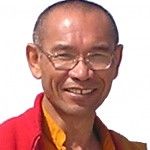 On February 19, 2014 a weekend encounter took place for the Dharma Friends of Israel met at the library (about 120 participants). The meeting was led by teacher Geshe Gen Gyatso, and its theme was “To treat the pains of the heart- Understanding the emotions spoiling our minds and torment our hearts”.
On February 19, 2014 a weekend encounter took place for the Dharma Friends of Israel met at the library (about 120 participants). The meeting was led by teacher Geshe Gen Gyatso, and its theme was “To treat the pains of the heart- Understanding the emotions spoiling our minds and torment our hearts”.
Course for Literature Teachers is underway
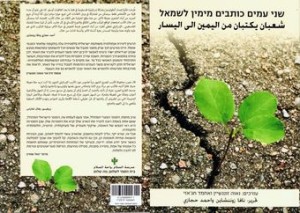 On March 20th 2014 we started a monthly course, run with the Ramallah-based NGO Tawasul, for Palestinian and Israeli literature teachers. The goal of the project is to train teachers to humanise the ‘other’ through literature, in a creative and critical way.
On March 20th 2014 we started a monthly course, run with the Ramallah-based NGO Tawasul, for Palestinian and Israeli literature teachers. The goal of the project is to train teachers to humanise the ‘other’ through literature, in a creative and critical way.
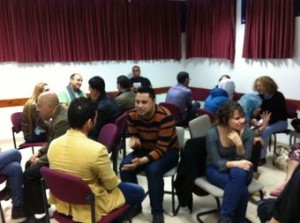 We opened the course with a three-day intensive seminar designed to introduce the Palestinians and Israelis to each other and to each other’s narratives. The participants had an intensive dialogue on daily life under occupation. There was a good listening process and the participants also spent a long time talking with each other in the evenings. On the third day we heard that three young people from Jenin had been killed by the Israeli army on that Friday night. One of the group participants had known one of those killed personally. The group felt very sad; they also felt that it is important to continue to fight this cruel reality and that they have a role to work with their students.
We opened the course with a three-day intensive seminar designed to introduce the Palestinians and Israelis to each other and to each other’s narratives. The participants had an intensive dialogue on daily life under occupation. There was a good listening process and the participants also spent a long time talking with each other in the evenings. On the third day we heard that three young people from Jenin had been killed by the Israeli army on that Friday night. One of the group participants had known one of those killed personally. The group felt very sad; they also felt that it is important to continue to fight this cruel reality and that they have a role to work with their students.
Over the 10-month course, through the works of key writers and poets of both peoples, teachers will examine national and ethnic identity, and issues related to the conflict. They will be provided with an anthology published by the SFP (Two People Write from Right to Left) and will be trained to teach the literature of the ‘other’ in their classrooms.
The 2nd International Rotary Youth and Young Adults Peace Conference
 On April 4 -9, 2014, the International Rotary Youth and Young Adults Peace Conference “Lead-Peace”, took place at the Fred Segal Friendship Library. About 150 young people from all over the world took part.
On April 4 -9, 2014, the International Rotary Youth and Young Adults Peace Conference “Lead-Peace”, took place at the Fred Segal Friendship Library. About 150 young people from all over the world took part.
The conference goal was “to enhance peace by promoting direct multi-cultural and multi-faith dialogue among youngsters from around the globe”.
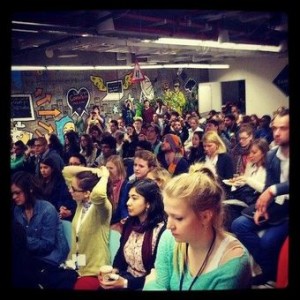 The conference included workshops, think tanks and guest lectures on the topic of multiculturalism and multi-faith. There were discussions and debates on shared values in different cultures and faiths. ‘Peace through Service’ projects were developed during the conference with the intention of subsequently implementing these globally in the different communities of the participants.
The conference included workshops, think tanks and guest lectures on the topic of multiculturalism and multi-faith. There were discussions and debates on shared values in different cultures and faiths. ‘Peace through Service’ projects were developed during the conference with the intention of subsequently implementing these globally in the different communities of the participants.
The program included also excursions to various ethnic and religious communities in Israel and day trips around Israel.
Forum for SFP’s facilitators, this time on a new Palestinian movie
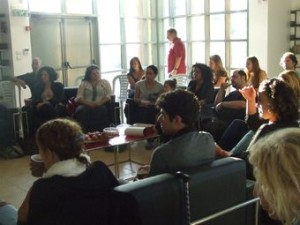 Rasha Sharkia presented a film on the situation in Occupied Palestine; the film shows the beauty of the people who live there and the impact of the occupation on their lives, it is an impressionist movie. There were about 25 people half of them SFP’s facilitators and half from the community. After the movie we had a good discussion.
Rasha Sharkia presented a film on the situation in Occupied Palestine; the film shows the beauty of the people who live there and the impact of the occupation on their lives, it is an impressionist movie. There were about 25 people half of them SFP’s facilitators and half from the community. After the movie we had a good discussion.

